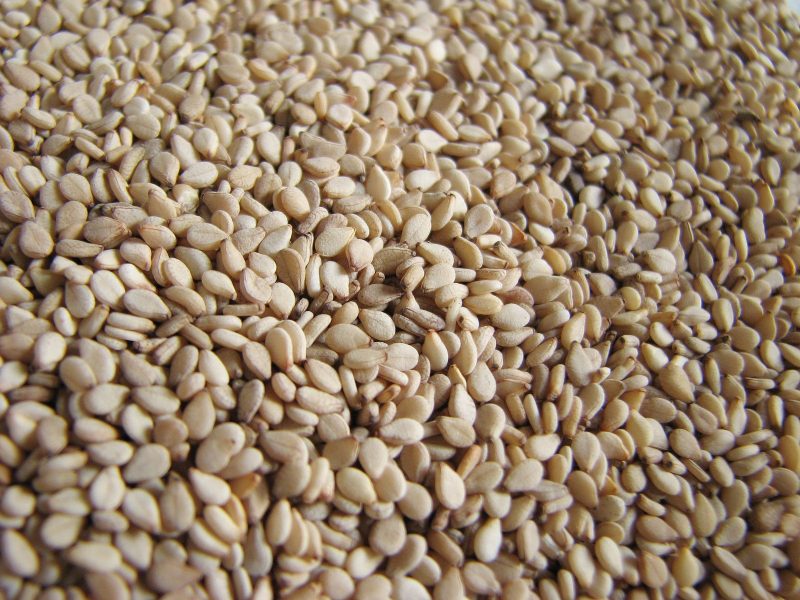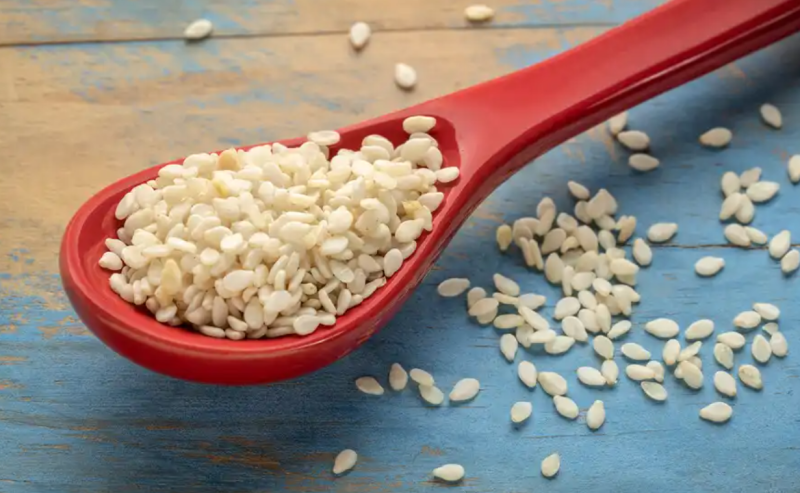
Sesame seeds, whose scientific name is Sesamum indicum, are popular in gastronomy, especially oriental. They are small, oval, and flat, often used in making bread, salads, soups, and many other recipes.
They have a slightly nutty flavor and add a crunchy texture to preparations. They are the main ingredient in traditional Asian dishes like tahini and the Middle Eastern sweet known as halvah. What are its properties? Why are they recommended for the diet?
Contents
Nutritional properties of sesame seeds
According to information compiled in the book The World’s Healthiest Foods, sesame seeds have high nutritional value. Its glycemic index is relatively low, and, in addition, they have 206 calories per 36 grams. They also provide the following nutrients:
- Manganese: 39% of the Recommended Daily Values (RVs).
- Calcium: 35% of VDRs.
- Phosphorus: 32% of the VDR.
- Magnesium: 30% of the VDR.
- Iron: 29% of the VDR.
- Zinc: 25% of the VDR.
- Selenium: 23% of the VDR.
- Vitamin B1: 23% of the VDR.
Among other things, and according to this same source, it contains unsaturated fatty acids, dietary fiber, protein, and substances such as lignans, which act as phytoestrogens.

Medicinal properties of sesame seeds
Due to their essential nutrient content, sesame seeds are credited with various medicinal properties. However, it is necessary to clarify that they are not curative food and cannot fight diseases independently.
, due to their exciting composition, they promote physical and mental well-being when included in a healthy diet. In addition, some scientific studies support its effects in preventing certain diseases. Next, we detail it.
Help reduce cholesterol and triglycerides.
High cholesterol and triglyceride levels are a risk factor for chronic cardiovascular disease. Although many factors are involved in its development, eating habits can have an effect for better or worse. So, it seems that a diet containing sesame seeds favors the control of these problems.
According to a systematic review published in the British Journal of Nutrition, regular consumption of sesame helps regulate cholesterol and triglyceride levels thanks to its vitamin E, fatty acids, fiber, and lignans content. Although there is a lack of evidence to confirm it, it is currently considered an ideal food for patients at risk of these diseases.
Promote muscle health
This food contains interesting amounts of protein that contribute to muscle health. Specifically, a 30-gram serving can provide around 5 grams of protein. Although they do not have all the amino acids, they are considered one of this nutrient’s most essential plant sources.
However, coinciding with a publication in the International Food Research Journal, eating toasted and shelled sesame seeds is preferable to increase their protein availability. These processes help reduce the presence of oxalates and phytates, compounds that interfere with protein assimilation.

They stimulate digestion
The dietary fiber in sesame seeds is helpful in stimulating digestive processes and preventing constipation. According to a meta-analysis published in the World Journal of Gastroenterology, fiber increases stool frequency in patients with constipation.
Help regulate blood pressure.
Although they are not a remedy against hypertension, consuming sesame seeds is healthy for patients with high blood pressure problems. Due to their contributions to magnesium, vitamin E, and antioxidant compounds, ingesting them helps maintain stable blood pressure.
In a study published in Nutrition Journal, patients with high blood pressure who consumed 2.5 grams of powdered black sesame seeds they reduced their systolic blood pressure by 6% compared to the placebo group.
Good for diabetic patients
Patients with diabetes or uncontrolled glucose levels can benefit from consuming these seeds. It is clear that they are not a substitute for medical treatment; however, due to their fiber, protein, and healthy fat content, they help control high blood sugar levels.
How to consume sesame seeds
Due to its slightly nutty flavor, sesame seeds are easy to introduce into many dishes. In general, it is recommended to roast them at 180℃ to improve their flavor and the availability of some nutrients. Thus they can be added to the following:
- Steamed broccoli.
- Cold or hot cereals.
- Granola bars.
- Bread and muffins.
- Cookies.
- Plain yogurt.
- Smoothies.
- Salads.
- Hummus.
Note: Recently, cases of allergy to sesame have been detected. It is essential to be careful when using this food and suspend its consumption in case of unwanted reactions.
Except in cases of allergy to sesame, this food is an excellent option to improve the quality of the diet. It is easy to add to preparations; it is satiating and promotes well-being. Enjoy it